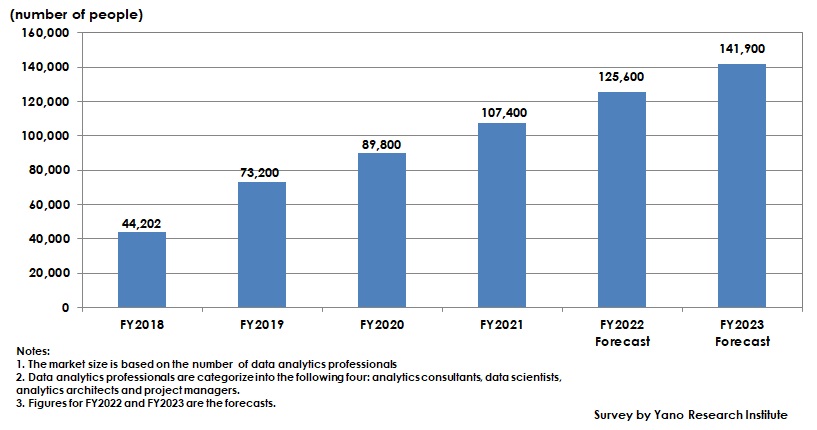No.2639
Data Analytics Professionals Market Size in Japan: Key Research Findings 2020
Number of Data Analytics Professionals Expected to be 89,800 People by FY2020, and to Reach 141,900 by FY2023
Yano Research Institute (the President, Takashi Mizukoshi) carried out a survey on data analytics professionals and found out the status, the trends by job type, and the future perspectives.

Market Overview
In the status where various sensors and smart devices have been widely accepted, enabling many companies to collect vast amount of data to be organized and analyzed for solving problems and bringing about unprecedented knowledge and information, more companies have hammered out to adopt data-driven management for utilizing data analytics for decision making. This has drawn attraction to data analytics experts such as analytics consultants, data scientists, analytic architects, and project managers, among which data scientists seem to be the most respected.
Currently, the environment surrounding data analytics professionals has been improving: The legal system is about to be prepared for protecting and utilizing personal data as well as industrial data including trade secrets; short and mid-term educational reforms have been in progress for generating distinguished human resources, as can see from Cabinet Office’s “AI Strategy 2019.” Such educational reforms include revisions in the Courses of Study for elementary and secondary schools, and some universities enhancing education of data science by establishing the department as well as graduate schools for data science.
Regarding businesses, some enterprises have embarked on organizing a data analytics project team, starting with recruitment of mid-career professionals. However, the candidates qualified for the job are, all in all, very limited. Therefore, companies have initiated educating and training their existing science-oriented employees including system engineers through continuing education, aka recurrent education.
*Recurrent education is the system to provide the opportunity of education and/or training for businesspeople within or outside the company (often at some educational institutions like universities and other companies).
Noteworthy Topics
Acceleration Observed in IT Businesses to Build a Structure to Secure Distinguished Human Resources, and in User Companies to Utilize More Data
Chiefly at major IT businesses, some recruitment programs targeting mid-career professionals and graduate-school students with remarkable results for high annual salaries have been implemented to firmly secure top talents. For new graduates, various in-house education courses have been provided, including some classes for “Python,” a programming language suitable for data analytics.
On the other hand, user companies, including those in the manufacturing industry and retailers intending to shift to data-driven management, have positioned data scientists as their instructors for such shift. Such companies tend to encourage their employees at various sites to take data analytics training, in conjunction with nurturing data scientists. Obviously, more companies have started using data scientists both for in-house and external activities, the former for enhancement of job efficiency and product improvement, and the latter for providing other companies with new data analytics solutions.
Also, educational businesses have accelerated their activities for educating data scientists at IT businesses and user companies. Mainly those companies established within universities or those businesses that excel in data analytics, have many educational programs certified by the authorities and place emphasis on bringing up data scientists against the backdrop of “Certification Issued for the Courses on IT-Skill Training to Meet the Era of the Fourth Industrial Revolution.”
Future Outlook
The number of data analytics professionals is expected to reach 141,900 by FY2023.
As more data analytics projects are increasing, regardless of whether they have something to do with AI or IoT, the demand for data analytics professionals, i.e., analytics consultants, data scientists, analytic architects, and project managers, are likely to expand furthermore.
The size of data analytics professionals is expected to expand furthermore for the future, as both IT businesses and user companies continue the vigorous recruitment and education of data scientists, while many tools for supporting data scientists emerge to facilitate the education, and architectures that implement business models into a system are on the rise.
Research Outline
2.Research Object: Domestic IT businesses, businesses specific in analysis and the user companies, etc.
3.Research Methogology: Face-to-face interviews by our expert researchers, surveys via telephone and email, and literature research
Data analytics professionals
Data analytics professionals in this research are categorized into the following four types that comprise a data analytics project: 1) Analytics Consultant (Involves with creating a data utilization strategy for the data analytics project) 2) Data Scientist (Involves with developing a model based on the analysis via data collection and programming language), 3) Analytics Architect (Involves with the phase of implementing the models developed by the data scientist to a system) and 4) Project Manager (Presides over the data analytics project). The market size has been calculated based on the number of professionals who can be one of four types mentioned above.
<Products and Services in the Market>
1) analytics consultants, 2) data scientists, 3) analytic architects, 4) project managers
Published Report
Contact Us
The copyright and all other rights pertaining to this report belong to Yano Research Institute.
Please contact our PR team when quoting the report contents for the purpose other than media coverage.
Depending on the purpose of using our report, we may ask you to present your sentences for confirmation beforehand.